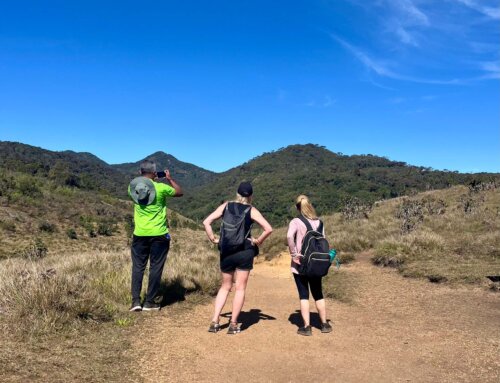By Carol Nesbitt, Psychotherapist & Guest Contributor
I have mixed feeling when it comes to travel.
There is a part of me that loves the thrill of exploring new places, tasting new flavours, and meeting new people. I love the sense of freedom of being away from home and escaping from the everyday routine.
Travel comes with the personal growth aspect. It can push you out of your comfort zone, and encourage you to embrace new experiences, face challenges and it can be a fantastic opportunity to learn about yourself, adapt and grow as a person.
The out of the comfort zone is the part of me that can find travel challenging, as I can get a little anxious about the new places, new people and the unknown. If travelling with friends or family, it can involve lots of different ways of wanting to spend time and sometimes the need to assert myself to make sure the trip is not all about keeping others happy.
If you have a tendency to people please, it can quickly become all about looking after someone else’s needs and not your own.
So, I know that when I travel to new places, I need to look after my wellbeing which means stepping away from keeping everyone else happy and taking time to please myself.
What is people pleasing?
People pleasing is a behaviour pattern characterised by an excessive need to gain the approval and acceptance of others. It involves going to great lengths to meet the expectations, desires, or perceived demands of those around you, often at the expense of your own needs.
People pleasers tend to be hyper-vigilant about the feelings of others’ and are driven by a fear of rejection or conflict. They may find it challenging to say “no” even if it contradicts with their own values or priorities. Whilst the need to be considerate and helpful is admirable, excessive people pleasing can become problematic when it leads to chronic stress, anxiety, loss of personal boundaries and a diminished sense of self.
The problem with people pleasing on trips
Unless you are a solo traveller, going away will involve time with family or friends This means it is essential to strike a balance between accommodating others and ensuing your own needs are met during your travels.
People pleasing on trips might seem harmless, but it can take away form the joy of travel in several ways. It can often lead to several pitfalls that can dampen your overall experience.
Sacrificing Personal Preferences: when you are constantly focusing on making others happy, you may find yourself compromising your needs and interests. This can lead to missing out on experiences or activities that you genuinely care about. Whether exploring new places or relaxing around the pool with a good book.
Increased Stress and Anxiety: Trying to keep everyone happy while traveling can be mentally taxing. The stress of constantly worrying out others’ needs, and preference can overshadow the relaxation and enjoyment of you seek.
Unspoken Frustrations: Unexpressed or unresolved tensions can build up within the group, leading to potential conflicts, the very thing that people pleasing is hoping to avoid, or resentment. Whilst you might be aiming for harmony, the unaddressed issues can lead to the opposite.
Missed Opportunities for Personal Growth: Travel is not just about exploring new destinations; it is also an opportunity for personal growth. People pleasing might discourage you from stepping out of your comfort zone, facing challenges, taking time to be mindful or space to think and learning more about yourself.
Regret and Discontent: If you spend your holiday and travels pleasing others’, after the trip you might look back and regret not taking charge of your own experiences. This can lead to a sense of dissatisfaction and a feeling of missing out on what could have been a more enjoyable experience.
How to Take Care of Your Needs When Travelling
If people pleasing is second nature to you, it is important to think about how you can better please yourself on your trip. Not in a selfish, “I don’t care about anyone” type of way, but a way to ensure that you have the experience you desire.
In advance of your trip, you could think about what your goals are for the trip, so you won’t get swept away in ‘going with the flow’ and doing what everyone else wants to do.
Here are some practical tips on how to embrace yourself and consider what you want, as well as making some choices that are about being kinder to you.
Reflect on Your Values: Start my considering what really matters to you on your travels. Is it adventure, relaxation, cultural exploration, or personal growth? Understanding your values will help align your travel choices.
Set Clear Objectives: Define specific goals for your trip. Do you want to learn a new language, disconnect from work, spend quality family time or explore local food? Setting clear objectives will help shape your itinerary.
Prioritise Activities: make a list of activities or experiences that align with your goals. Prioritising these activities can help you stay focused on what you want to do.
Consider Your Travel Style: Are you a spontaneous explorer or a meticulous planner? Understanding your travel styles will help guide you when decision making.
Learn to Say “No”: it’s okay to decline invitations or activities that don’t alight with your desires. I recently when on a trip with three friends who all wanted to go and visit the local market. As a non-lover of busy, crowded spaces or shopping as a whole, I declined to go and had a few hours sitting by the pool reading my book until they returned. Saying “no” when necessary is a valuable skill.
Schedule “Me” Time: Dedicate time for yourself, whether it’s to relax, read, go for a walk, or simply enjoy your surroundings. Taking a little time for yourself is self-centred and doesn’t make you uncaring. Alone time is essential for self-care.
Reconnecting with Loved Ones: By taking time for you and considering what is important to you when you travel will mean you are being open, honest, and true to authentic. This can lead to better connection with your travel companions. Strengthening relationships can help to create shared experiences. It allows you to bond, relax and create lasting memories.
In essence, while it’s lovely to consider the preferences and happiness of your travel companions, striking a balance between accommodating others and ensuring your own needs and desires are met is crucial. After all, travel should be about making cherished memories and having enriching experiences, not just pleasing others.
For more helpful information on this subject, check out Carol’s ’Please yourself’ online workshop





